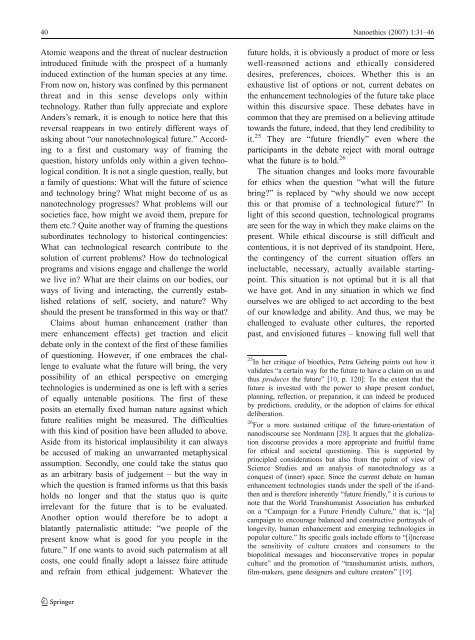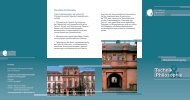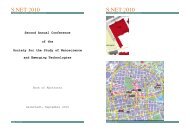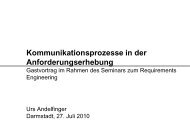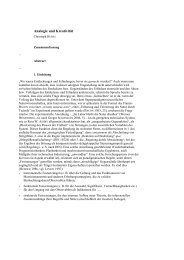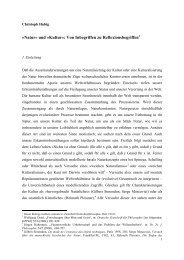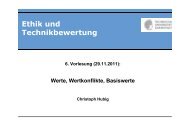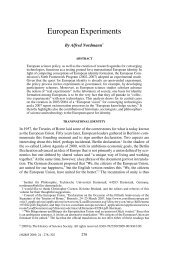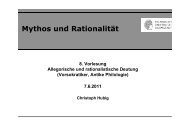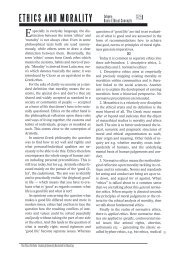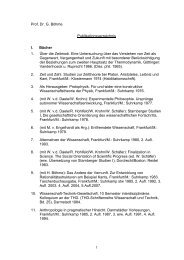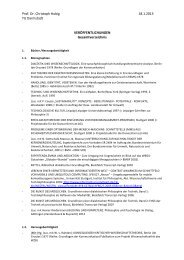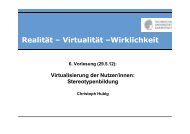If and Then: A Critique of Speculative NanoEthics - Common Sense ...
If and Then: A Critique of Speculative NanoEthics - Common Sense ...
If and Then: A Critique of Speculative NanoEthics - Common Sense ...
You also want an ePaper? Increase the reach of your titles
YUMPU automatically turns print PDFs into web optimized ePapers that Google loves.
40 Nanoethics (2007) 1:31–46<br />
Atomic weapons <strong>and</strong> the threat <strong>of</strong> nuclear destruction<br />
introduced finitude with the prospect <strong>of</strong> a humanly<br />
induced extinction <strong>of</strong> the human species at any time.<br />
From now on, history was confined by this permanent<br />
threat <strong>and</strong> in this sense develops only within<br />
technology. Rather than fully appreciate <strong>and</strong> explore<br />
Anders’s remark, it is enough to notice here that this<br />
reversal reappears in two entirely different ways <strong>of</strong><br />
asking about “our nanotechnological future.” According<br />
to a first <strong>and</strong> customary way <strong>of</strong> framing the<br />
question, history unfolds only within a given technological<br />
condition. It is not a single question, really, but<br />
a family <strong>of</strong> questions: What will the future <strong>of</strong> science<br />
<strong>and</strong> technology bring? What might become <strong>of</strong> us as<br />
nanotechnology progresses? What problems will our<br />
societies face, how might we avoid them, prepare for<br />
them etc.? Quite another way <strong>of</strong> framing the questions<br />
subordinates technology to historical contingencies:<br />
What can technological research contribute to the<br />
solution <strong>of</strong> current problems? How do technological<br />
programs <strong>and</strong> visions engage <strong>and</strong> challenge the world<br />
we live in? What are their claims on our bodies, our<br />
ways <strong>of</strong> living <strong>and</strong> interacting, the currently established<br />
relations <strong>of</strong> self, society, <strong>and</strong> nature? Why<br />
should the present be transformed in this way or that?<br />
Claims about human enhancement (rather than<br />
mere enhancement effects) get traction <strong>and</strong> elicit<br />
debate only in the context <strong>of</strong> the first <strong>of</strong> these families<br />
<strong>of</strong> questioning. However, if one embraces the challenge<br />
to evaluate what the future will bring, the very<br />
possibility <strong>of</strong> an ethical perspective on emerging<br />
technologies is undermined as one is left with a series<br />
<strong>of</strong> equally untenable positions. The first <strong>of</strong> these<br />
posits an eternally fixed human nature against which<br />
future realities might be measured. The difficulties<br />
with this kind <strong>of</strong> position have been alluded to above.<br />
Aside from its historical implausibility it can always<br />
be accused <strong>of</strong> making an unwarranted metaphysical<br />
assumption. Secondly, one could take the status quo<br />
as an arbitrary basis <strong>of</strong> judgement – but the way in<br />
which the question is framed informs us that this basis<br />
holds no longer <strong>and</strong> that the status quo is quite<br />
irrelevant for the future that is to be evaluated.<br />
Another option would therefore be to adopt a<br />
blatantly paternalistic attitude: “we people <strong>of</strong> the<br />
present know what is good for you people in the<br />
future.” <strong>If</strong> one wants to avoid such paternalism at all<br />
costs, one could finally adopt a laissez faire attitude<br />
<strong>and</strong> refrain from ethical judgement: Whatever the<br />
future holds, it is obviously a product <strong>of</strong> more or less<br />
well-reasoned actions <strong>and</strong> ethically considered<br />
desires, preferences, choices. Whether this is an<br />
exhaustive list <strong>of</strong> options or not, current debates on<br />
the enhancement technologies <strong>of</strong> the future take place<br />
within this discursive space. These debates have in<br />
common that they are premised on a believing attitude<br />
towards the future, indeed, that they lend credibility to<br />
it. 25 They are “future friendly” even where the<br />
participants in the debate reject with moral outrage<br />
what the future is to hold. 26<br />
The situation changes <strong>and</strong> looks more favourable<br />
for ethics when the question “what will the future<br />
bring?” is replaced by “why should we now accept<br />
this or that promise <strong>of</strong> a technological future?” In<br />
light <strong>of</strong> this second question, technological programs<br />
are seen for the way in which they make claims on the<br />
present. While ethical discourse is still difficult <strong>and</strong><br />
contentious, it is not deprived <strong>of</strong> its st<strong>and</strong>point. Here,<br />
the contingency <strong>of</strong> the current situation <strong>of</strong>fers an<br />
ineluctable, necessary, actually available startingpoint.<br />
This situation is not optimal but it is all that<br />
we have got. And in any situation in which we find<br />
ourselves we are obliged to act according to the best<br />
<strong>of</strong> our knowledge <strong>and</strong> ability. And thus, we may be<br />
challenged to evaluate other cultures, the reported<br />
past, <strong>and</strong> envisioned futures – knowing full well that<br />
25 In her critique <strong>of</strong> bioethics, Petra Gehring points out how it<br />
validates “a certain way for the future to have a claim on us <strong>and</strong><br />
thus produces the future” [10, p. 120]: To the extent that the<br />
future is invested with the power to shape present conduct,<br />
planning, reflection, or preparation, it can indeed be produced<br />
by predictions, credulity, or the adoption <strong>of</strong> claims for ethical<br />
deliberation.<br />
26 For a more sustained critique <strong>of</strong> the future-orientation <strong>of</strong><br />
nanodiscourse see Nordmann [28]. It argues that the globalization<br />
discourse provides a more appropriate <strong>and</strong> fruitful frame<br />
for ethical <strong>and</strong> societal questioning. This is supported by<br />
principled considerations but also from the point <strong>of</strong> view <strong>of</strong><br />
Science Studies <strong>and</strong> an analysis <strong>of</strong> nanotechnology as a<br />
conquest <strong>of</strong> (inner) space. Since the current debate on human<br />
enhancement technologies st<strong>and</strong>s under the spell <strong>of</strong> the if-<strong>and</strong>then<br />
<strong>and</strong> is therefore inherently “future friendly,” it is curious to<br />
note that the World Transhumanist Association has embarked<br />
on a “Campaign for a Future Friendly Culture,” that is, “[a]<br />
campaign to encourage balanced <strong>and</strong> constructive portrayals <strong>of</strong><br />
longevity, human enhancement <strong>and</strong> emerging technologies in<br />
popular culture.” Its specific goals include efforts to “[i]ncrease<br />
the sensitivity <strong>of</strong> culture creators <strong>and</strong> consumers to the<br />
biopolitical messages <strong>and</strong> bioconservative tropes in popular<br />
culture” <strong>and</strong> the promotion <strong>of</strong> “transhumanist artists, authors,<br />
film-makers, game designers <strong>and</strong> culture creators” [19].


